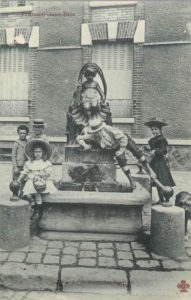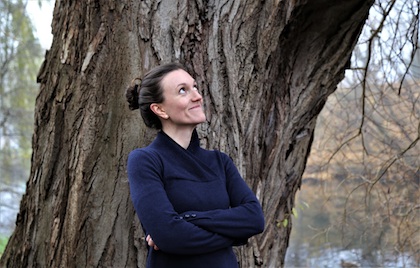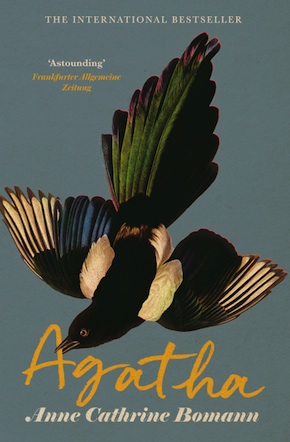Anne Cathrine Bomann: How to relate
by Mark ReynoldsDanish psychologist, poet – and former national table-tennis champion Anne Cathrine Bomann’s debut novel Agatha is a tender portrait of an ageing, jaded doctor whose life is nudged towards greater fulfilment through the arrival at his clinic of a younger female patient, who forces him to look up from his distracted doodling and re-engage with his patients and with the wider world. First published in Denmark in 2017, its carefully judged themes of loneliness, fear, the invisibility of old age, the search for meaning, and delight in unexpected connections and self-knowledge have since struck a chord internationally, with editions now published or forthcoming in 23 languages.
MR: Your protagonist is a socially withdrawn, lonely and unfulfilled 71-year-old French psychiatrist working in the town of Fontenay-sous-Bois outside Paris in 1948. On the face of it, he is detached from yourself in many ways, and yet he inhabits a house you actually lived in many decades later. What else connects you and him?
ACB: Yes, you are quite right, on the surface we are different, but without intending it to be so from the beginning I now realise that we have quite a lot in common. Our professions, for one. I am a psychologist, and even though my protagonist is a psychiatrist, he also works with psychotherapy, so a lot of his experiences with patients and his reflections on how to be a good therapist are borrowed from my own life. I also recognise some of his more existentialist thoughts about how to create a life worth living, his loneliness and his anxiety, although I have enlarged these features in him. So you might say that in some ways he is an extreme version of me.
What drew you to writing about this place and time? Was it in part to examine old, discredited psychological methods, or perhaps to deflect implied criticism of current practitioners?
Actually, the words and the general tone of the book came to me before I had planned who should be in it, where it should take place and what it should even be about. I simply started writing, and the first thing that came to me was the picture of a lonely, elderly man walking around a lake. And eventually, the different characters came alive on the page. So it was the language and the tone that led me to decide to place the action in the 1940s and in France. As you said earlier, I lived a year in Fontenay-sous-Bois when I was 18, and the mental images of my time there just popped into my head as I was working on the book. Also, I must admit that it was a pleasure to skip computers, mobile phones and other aspects of modern life as a consequence of the time period that I chose for Agatha. And finally, it gave me a way to make the doctor even more detached from those around him, since his way of doing therapy allows him to sit behind his patients as he is talking to them, letting them do most of the talking and so on, whereas I myself and most of my colleagues are much more active and engaged. So to me, the doctor’s way of practicing reflects his personality.
Agatha has been subject to electric shock therapy and other treatments she knows aren’t helping her recover. Why does she believe his help would be more effective?
For one, she has heard good things about the doctor from a friend that she trusts. And apart from that I think she just desperately seeks someone who will talk to her, listen and take her seriously instead of admitting her to a hospital or offering her medicine and so on. And eventually, I think she feels seen and helped by the doctor because he actually cares for her.
I had no plan whatsoever for any of the characters from the outset, I just began writing and was as surprised as anyone else to see what happened along the way.”
Does electric shock treatment still have a place in mental health therapy today?
Yes, and in fact it does show good results with mental illnesses such as severe depression. And it is performed in a much more pleasant ambiance today than what we imagine or have perhaps seen in films like One Flew Over the Cuckoo’s Nest and the like. There can be side effects like memory loss, but for some people ECT (Electroconvulsive therapy) actually offers great relief where nothing else works.
Without Agatha’s intervention, and his belated appreciation of his longsuffering secretary Madame Surrugue, the narrator would be a largely unsympathetic character. Did you set out to write someone who needs to transform in order to connect with others?

Fontaine de la Rosette, Fontenay-sous-Bois (undated). e-monument.net
As mentioned, I had no plan whatsoever for any of the characters from the outset, I just began writing and was as surprised as anyone else to see what happened along the way. At one point I actually thought that the doctor would end up taking his own life. But the story took a different turn, and I guess that I myself got to know the doctor better and also found aspects of him to relate to and sympathise with. I wanted to write something about the human condition, and no, the doctor certainly isn’t perfect, not even close, but as you suggest that also gave me room to let him evolve and learn something about both himself and other people throughout the story. That is, I have learned, one of the great joys of being an author; to be surprised by your own characters, gain an understanding of them and through that process perhaps even about yourself.
Agatha is also on a journey as she challenges the doctor to accept he is similarly in need of help – and can help her. Which character came to you first, and how did they develop together as you wrote?
It is actually very simple; the characters came to me in the order that they occur in the book. First, the doctor. Then I figured out that he was an ageing psychiatrist, and he went to work in his clinic. There, I thought it would make sense for him to have a secretary, so in entered Madame Surrugue, and when he had to see some patients, Agatha came to life. And for instance, I wrote Agatha’s dream about the telescope without having any idea that it would end up fitting nicely with the doctor’s interpretation of her need to be seen. So I planted a lot of different seeds in the beginning and tried to attend to all of them throughout the rest of the book.
To me, Agatha is an interesting character, but her most important function in the book is to wake up the doctor and be the catalyst for change that he so desperately needs.
The Italian edition, L’ora di Agathe won the 2019 Scrivere per Amore prize. Is this a love story?Not primarily, or not a classic one anyway, I would say. But it is a story about a lonely man who is saved from his own meaningless existence when he realises that he needs to relate to other people. So you might say that he is awoken by love, or by the idea of love, and that he finds out that in some sense he has wasted his entire life hiding from others, but that it is perhaps not yet too late to change.
Being in touch with the more introverted, anxious side of myself who often feels misplaced makes it possible to write about characters who struggle with similar issues.”
You describe yourself as an introvert. Has that ever held you back, or is it a facet of your character you’re perfectly content with? Has it helped with the long periods of solitude that come with being a writer? And is it something you’ve had to overcome to some extent as you promote your work?
Being an introvert with a splash of social anxiety has definitely held me back and in some ways still does. It can make it difficult for me to try new things, to be as social as I would sometimes like to be and to relax in social settings where I have to take part. But I am coming more to terms with it as I get older; in my younger years I did not really understand or accept that side of me and probably pushed myself into a way of living that was not really in sync with how I thrive the most. Now I am better at balancing time for myself, writing, reading, being with my boyfriend and close friends, and all of the more stressful parts of life. It has always been a challenge for me to be in situations where I can be judged by others. Therefore it was sometimes difficult to play table tennis at a high level. Playing for the national team and for clubs around Europe, I sometimes felt like the real battle was going on within myself and not at the table. Similarly, it is a constant challenge to say yes to book-related events, talking in public about my writing and so on. But it seems to be part of the game, and I accept the challenge – which also comes with lots of perks like meeting wonderful new people in the book world, travelling and talking to readers, and I know that I am very privileged indeed that anyone cares what I have to say.
Finally, being in touch with the more introverted, anxious side of myself who often feels misplaced makes it possible to write about characters who struggle with similar issues, and like you suggest, the fact that I enjoy my own company is probably an important part of being able to write.
The UK edition is beautifully made. Has it been launched in most territories as a cloth-covered pocket-sized hardback? How do you feel about the choice of a magpie to represent your narrator’s doodling or his state of mind?
I agree, it is truly beautiful. It is very exciting for me every time I am presented with a new cover, since they are actually quite different in their styles. Until now, many of them have been pocket-sized hardbacks yes, but for instance the French and the Italian ones are paperbacks – just like the Danish original.
The cover for the Danish book was my idea, featuring the sparrow which is meant to represent Agatha. But my editor in the UK suggested the magpie to me and told me that in the UK a lone magpie is bad luck, and that if you see one, you are supposed to say ‘where’s your mate?’ That fits well with my story, and the bird just looks beautiful on the cover. It has actually made me pay much more attention to this bird when I see it in nature; before I did not realise how beautiful its colours are.
Caroline Waight really struck the tone I was aiming for and was very easy to talk to about my thoughts and preferences, and her translation was a great advocate for the book.”
You recently launched your first YA novel, Hvad Ingen Ved (What No One Knows), which also has psychology at its heart. Could you say a little about the plot? And are there any plans yet for an English translation?
Yes, my first YA novel came out in the spring here in Denmark. It is very different from Agatha in a lot of ways; it takes place in my hometown Hillerød in the present day, and there are two protagonists who take turns in telling the story each chapter. They are brothers, and the youngest, Immanuel, is a clever, lonely boy who is bullied by his classmates. But his teacher asks him to tutor a girl in maths, and this forces him to become more visible both to others and himself. His brother Jonas is a table-tennis coach, and from the outset he seems to have an easy life with good friends and nothing much to worry about. But as the plot develops, Jonas finds himself falling in love with one of the boys that he is coaching, and he eventually has to face the fact that he is perhaps part of one of societies most hated groups: a paedophile. But how does one live with that, and can he ever reveal his secret to those closest to him? In the book I discuss themes like ethics and evil, trying to make the reader consider for instance whether it is our feelings and thoughts or rather our actions that determine our moral character.
For the moment there are no plans for translations anywhere. Perhaps the themes are a little too controversial, I don’t know. But fingers crossed, it might still happen.
How closely did you work with Caroline Waight on the translation of Agatha?
Very closely indeed, I would say. It was Caroline who did the very first translation, which my agency and I sent to publishers around the world, and in that way she has a lot to do with the success the book has had. Caroline just really struck the tone I was aiming for and was very easy to talk to about my thoughts and preferences, and her translation was a great advocate for the book. Later, when Sceptre bought the rights, I got to work with Caroline once again, going through her first translation and changing some things here and there in collaboration with the editor. It has been a very enjoyable process for me.
I’m a fan of Dorthe Nors, but realise I’ve not read anyone else from Denmark recently. Who do you particularly recommend – whether already translated into English or not?
I am personally a big fan of Tine Høeg’s debut novel, which is part novel, part poem, called Nye Rejsende (New Travellers). She is soon publishing her next book, and I can’t wait to read it. I actually never read Dorthe Nors, but definitely will. Also, if you have not read Naja Marie Aidt’s book about the loss of her son, When Death Takes Something From You Give It Back, that is an absolute must.
You have also written a non-fiction book about schizophrenia, and two poetry collections. Do you still write poetry? What are you writing next?
From time to time, I return to poetry. But for now, it is nothing I think about publishing, it is just for me. I have two texts on my desk at the moment; one about a very ambivalent mother, which is quite poetic and dense, and a longer novel – or so it will be eventually – about grief. Both are fiction and written for adult readers, but I would like to write both non-fiction and YA again sometime, since I enjoyed both genres very much.
Are you tempted by the prospect of writing full-time, or would you be unwilling to give up your role as a therapist?
Very tempted indeed! If I had enough money to do so, I would quit working as a psychologist. But for now I try to see the bright side of going out, talking to my colleagues, hearing new and inspiring stories and hopefully doing some good. I like my job, I just love writing.
 Anne Cathrine Bomann divides her time between writing and working as a psychologist. Born in 1983, she played table tennis for Denmark and won the national championship twelve times. She lives in Copenhagen. Agatha, translated by Caroline Waight, is out now from Sceptre in hardback and eBook.
Anne Cathrine Bomann divides her time between writing and working as a psychologist. Born in 1983, she played table tennis for Denmark and won the national championship twelve times. She lives in Copenhagen. Agatha, translated by Caroline Waight, is out now from Sceptre in hardback and eBook.
Read more
annecathrinebomann.dk
@annecathrinebomann
@SceptreBooks
Author portrait © Diana Juncher
Caroline Waight studied music at Cambridge, Oxford and Cornell Universities and is a translator from Danish and German. Winner of the 2014 Goethe-Institut Award for New Translation, her other translations include Jens Andersen’s Astrid Lindgren: The Woman Behind Pippi Longstocking and Søren Sveistrup’s The Chestnut Man.
Mark Reynolds is a freelance editor and writer, and a founding editor of Bookanista.
@bookanista
wearebookanista


